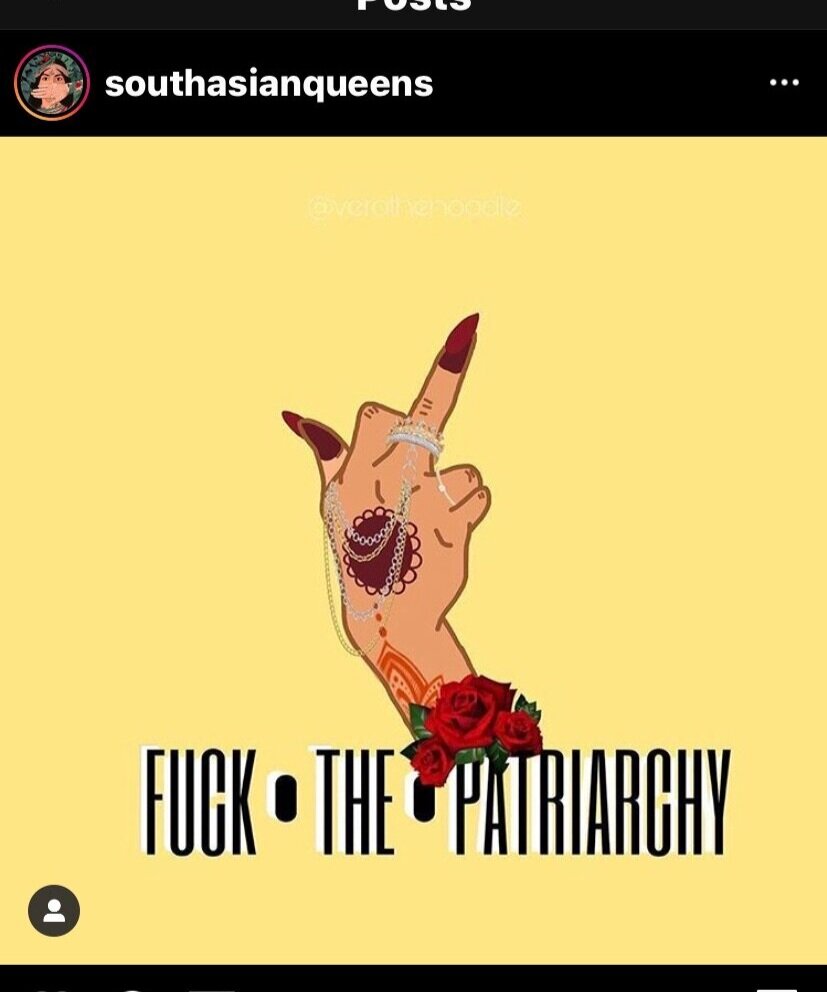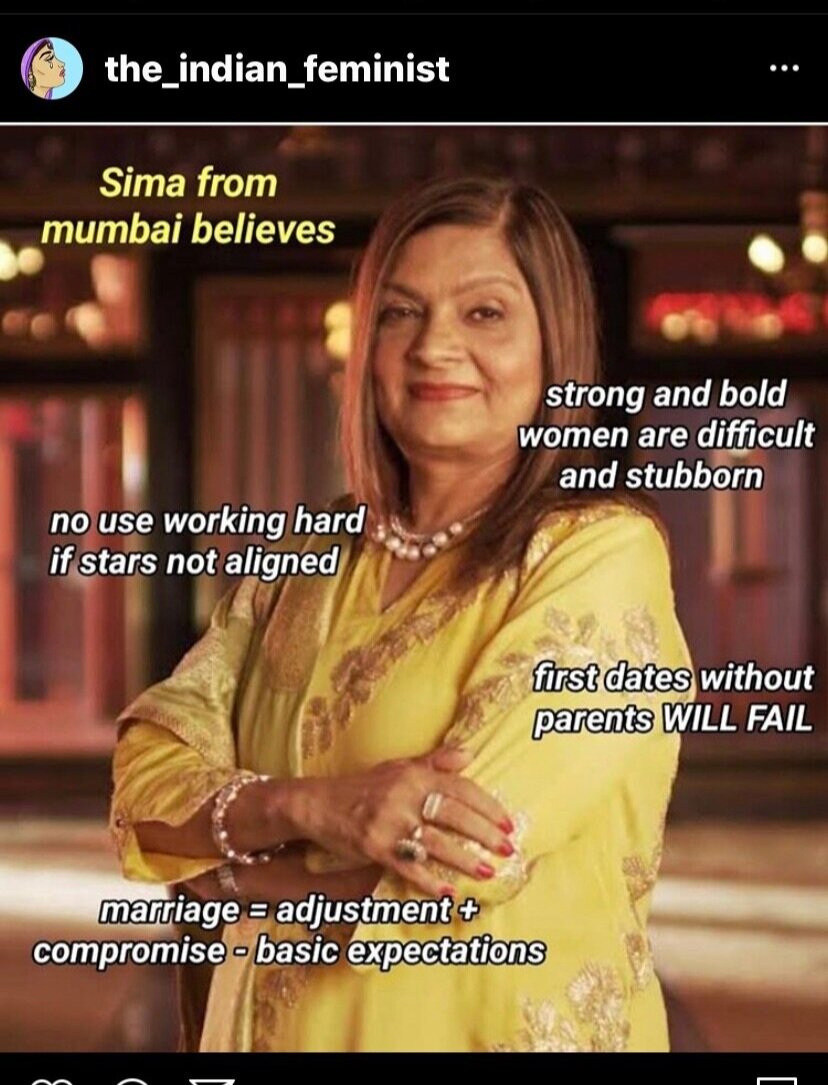Adjust this!
Sex Selection in the South Asian community: Adjust this!
Recently in my extended family there has been talk about this new Netflix show "Indian matchmaking." I rolled my eyes at the thought of this and my blood started to boil at the idea of the amount of colorism I was going to hear. You know the, “ I need light skin or wheatish complexion,” but of course not dark!
But, what actually made my blood boil, was the use of the word "adjustment". Some might say it is equivalent to a western compromise. So what's the big deal you might ask?Well I don’t agree with that either, because in most of the relationships, I see the women doing a lot more work, and having to ask their “partners”, who are grown people with a brain to “pitch in”. For example to make a meal, or to clean a bathroom. Now, there are in some relationships, male partners that I do adore, because they perform these basic duties without being asked. But then I get in trouble with my female friends, who ask, “why does he get a high-five” for taking care of the kids? Well to be honest, I try to explain, because it's still so rare to see a real equal partnership. Marriage is intertwined with patriarchy, and I think it's the way society secretly wants it. To me, I see evidence of patriarchy and sexism when I see females, the majority of the time going out of their way to make sure the list of “To dos” are done by themselves. A lot of guys don’t bother with making a list, because in my experience, the guys never seem to feel the need to make one.
Given my life experience with alopecia at the age of 7 and again at age 16 and a sudden massive stroke at a healthy age of 36 I have been forced to be flexible as a bald disabled female. My problem is with the South Asian indian word usage of “adjustment” and “flexible”, as these usually fall on the female to carry out.
Now is the show playing off stereotypes? From what I see, in terms of the way South Asian students and a few South Asian friends in high school are raised, despite our brown skin being the same, we come from very different cultural upbringing..
I was encouraged to go out anywhere I wanted, however, my indian female friends could only go to the library, that was more than 20 years ago. Now when I talk to my south asian students many of the females have very different rules than the boys do, if the boys even have any; both need to do very well in studies especially math and science. However, girls also need to be adept at house work. I've asked my students in class who does the housework, majority of the girls put up their hands, beside one or two boys that are usually first born.
And then I ask, the boys ``how is that fair?" Most just giggle and shrug it off saying, that's just the way it is. At this point a few of the girls are fuming and yelling at the boys, about why it's not fair. Probably everything they'd like to tell their parents/grandparents/Uncles/ Aunties. Which parents need to hear,
In India we know that inequality among the genders can lead to death, often before even being born.. Now what happens when you move to another country? Well cultural values come with them, so does the microaggressions. Girls must be in the house, basically not seen or heard and learn to cook and clean. These are the baby steps to larger aggressions such as aborting baby girls.
A CBC study found that,In Canada sex-selection and aborting females is a reality, We dont want to talk about. We like to “save girls'' in Developing Countries A CBC study found,“While the natural odds of having a boy over a girl are slightly higher, they are consistent across the globe: up to 107 boys for every 100 girls. But Indian-born mothers living in Canada with two children had 138 boys for every 100 girls. In Ontario, that number inflated even more among Indian-born women with two daughters, who then gave birth to 196 boys for every 100 girls.” ( CBC, 2016).
This, obvious sex-selection sees males as more worthy of life, and once born, have the liberty to do as they please. While the Indian females brought into the world, are just supposed to be happy they were born. The outright Misogyny within the South Asian communities in Canada, and yes in various other cultures as a whole, especially in North America, I feel goes unchecked. The white and at times Asian Liberals are ready to save the girls in any other part of the world, than look in their own backyard. In Ontario, Brampton has its own “Save the Girl” problems. We are all too scared to name it, because we will be seen as racist or working off of stereotypes. The unequal treatment of South Asians is very real and can have devastating effects on the females sense of value.
For example, cultural pressures to pursue marriages and carry out their domestic duties they’ve been training for since birth, is one of the expected steps. All the “adjustments” they made in their family life to ensure the brother, dad, uncle, are all fine, play a crucial role in having a successful marriage.
This South Asian attitude towards the Institution of marriage is one that I’m shocked at, and one that the females as a whole still buy into. The expectations within that institution is still riddled with patriarchy. If this was not the case then both male and females would be going back to work at an equal level post the Pandemic.
An article put out by BBC stated, “Mothers are worried that they're putting themselves at risk of redundancy, or getting into trouble at work because they haven't been able to perform as well as they usually do." (BBc, 2020). Furthermore, a recent United Nations study warned that COVID-19 risked reversing decades of progress concerning gender equality in the workforce. Now if the institution of marriage was a true partnership we would not be dealing with this, which leads me to a question I've pondered since highschool or probably earlier; “can a woman truly have it all; a successful career that she can give her time to and a family?”
Can you have it all?
At a very young age I informed my parents that I was never getting married. They rolled their eyes at me so I grabbed a paper, wrote it down and kept it on the top of the fridge so it'd be safe forever. At the age of 42, I’m still happily unmarried, but now when I reflect back, I don’t know what had caused me to have such a strong disposition, my parents had an average marriage, I’d say. As I grew-up, entered high school and then university, I still knew marriage was not one of my goals., I was going to choose a career over marriage. I didn’t think as a female you can be dedicated to your career, and have a family. Women still do a large part of the house work and child rearing.
I chose the career path of education. For me being a high school teacher was not something I chose lightly, I went into my career later in life, so I’d have some real life experience to bring into the classroom. I recently received a very heartfelt inspiring message from a student I had taught in my early days, I'm embarrassingly going to share it here.
My mind is always in teacher mode. I watch a movie - that would be great to teach. As a South Asian female teacher, at times, I've also seen my fellow brown females enjoy bonding with me over our cultural similarities, and since I resisted many of the similar traditions. For example I moved out of my parental home during university, travelled alone, studied The Arts. By my life style i've shown my students that there are other options, besides the ones generated by a patriarchal mind set. I kinda secretly think of myself as their aunty. As a result I've had brown female girls even take women studies courses, which in a South Asian mindset would be considered useless or at the very least , nothing that would make the parents proud.
I treat each of my students as if they were my own. Sometimes I’ve heard female teacher’s say “as a mother I….”. Well As a person who decided not to have kids and who Life decided to throw a few curve balls at, took me on a different path, I find that phrase extremely naive and offensive!! Despite not giving birth, it does not mean I can't have deep empathy for a person. I give my heart and soul to my students plus my time, weekends, and the summer vacations are often spent creating new lessons that I think kids need. For example helping kids understand the #Metoo movement and helping our kids understand what a healthy relationship looks like. I asked my kids recently “how many of you want to get married? Everyone raised their hands. I was in shock, so I asked next “why”? Majority of the students' answers had to do with companionship and not wanting to be alone, I explained alone doesn’t mean lonely .There are many people that are married but are lonely.
In North America, we are into the” #metoo'' movement. This is a huge challenge for the South Asian mindset, where the female is constantly making “adjustments” to accommodate the patriarchy within the culture. This “adjustment” mindset gets very confusing when the talk is about “Consent” in a relationship. When you break down adjustment, in the South Asian context, it means that the girl is expected to eventually give in and adjust to what is taking place. And so “no” never really means ``No.” In the world of “adjustment” it's part of the Bollywood dance of being a tease. So the female voice is not taken seriously, “No” equals try harder, and you just might get lucky, by wearing her down.In North America we now understand that to mean “Sexual harassment”.
Maybe in another world I would have believed in the institution of marriage, but patriarchy has ruined it. It's no surprise that with Covid19, getting back to work will be harder for women than men, because of the domestic duties that fall on her. Please Aunties and Uncles stop this expectation of “Adjustment”, or at least make it expected of both male and female.
Further Resources:
Ted Talk: Narayan Deepa: 7 Beliefsthat can silence women and how to unlearn them
https://www.bbc.com/news/business-53363253






